Where Stormwater Pollution Comes From
When it rains or snows, oil, antifreeze, detergents, pesticides and other pollutants get washed from driveways, yards, parking lots, streets, farm fields, and construction sites into swales and storm drains and then directly into streams and rivers.
The items in this section describe some everyday pollutants that commonly find their way into stormwater runoff. Read about:
- Fertilizers and Pesticides
- Pet Wastes
- Vehicle Maintenance
- Washing your Car and Pavements
- Yard Wastes
- Trash and Litter
- Cigarette Butt Disposal
- Household Products
- Disposal of Household Chemicals
- Construction Sites
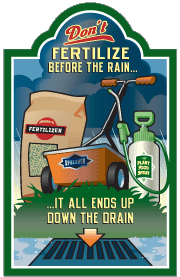 Per acre, homes use more pesticides than farms. Applying fertilizer and pesticides before a rain produces large
amounts of polluted runoff. Contrary to popular belief, rain does not help "soak in" the chemicals but rather washes them away down a storm drain.
Once these chemicals are introduced into lakes and streams they promote the growth of algae that kills fish. By applying chemicals several days before rain is forecast,
you can help your yard and the environment. Also, consider reducing the number of applications of fertilizer and pesticides.
Per acre, homes use more pesticides than farms. Applying fertilizer and pesticides before a rain produces large
amounts of polluted runoff. Contrary to popular belief, rain does not help "soak in" the chemicals but rather washes them away down a storm drain.
Once these chemicals are introduced into lakes and streams they promote the growth of algae that kills fish. By applying chemicals several days before rain is forecast,
you can help your yard and the environment. Also, consider reducing the number of applications of fertilizer and pesticides.
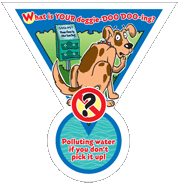 Pet waste left on the ground gets carried away by stormwater, contributing harmful nutrients, bacteria, parasites and viruses to our streams,
rivers and bays. Clean up after your pet and dispose of the waste down the toilet or in the garbage. Never dispose of pet waste down the storm drain!
Pet waste left on the ground gets carried away by stormwater, contributing harmful nutrients, bacteria, parasites and viruses to our streams,
rivers and bays. Clean up after your pet and dispose of the waste down the toilet or in the garbage. Never dispose of pet waste down the storm drain!
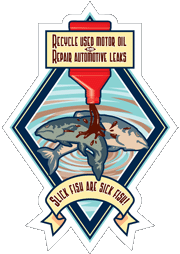 Vehicle fluids such as oil, gas, and antifreeze are a major water quality problem nationwide. A single quart of used motor oil can contaminate a
quarter of a million gallons of fresh water! Maintain your vehicles to prevent dripping onto driveways and roads. Recycle used oil - NEVER dump it into a storm drain!
Call the Delaware Solid Waste Authority at 800.404.7080 or go to www.dswa.com for a
complete list of drop off locations in your area.
Vehicle fluids such as oil, gas, and antifreeze are a major water quality problem nationwide. A single quart of used motor oil can contaminate a
quarter of a million gallons of fresh water! Maintain your vehicles to prevent dripping onto driveways and roads. Recycle used oil - NEVER dump it into a storm drain!
Call the Delaware Solid Waste Authority at 800.404.7080 or go to www.dswa.com for a
complete list of drop off locations in your area.
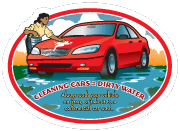 Washing your car on pavement allows dirt, oils and detergents to run into storm drains. To prevent stormwater pollution, use commercial
car washes, which treat or recycle water, or wash your vehicle on grassed areas so that the runoff can soak into the ground. Hosing off pavements washes
pollutants into storm drains leading straight to surface waters. Sweep your debris into a proper receptacle - Not into the storm drain!
Washing your car on pavement allows dirt, oils and detergents to run into storm drains. To prevent stormwater pollution, use commercial
car washes, which treat or recycle water, or wash your vehicle on grassed areas so that the runoff can soak into the ground. Hosing off pavements washes
pollutants into storm drains leading straight to surface waters. Sweep your debris into a proper receptacle - Not into the storm drain!
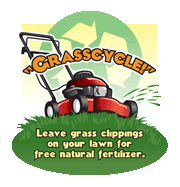 Yard waste such as grass clippings, tree trimmings, and leaves can clog storm drains causing pooling water and creating dangerous driving conditions.
They also add excess nutrients to ponds and stream, leading to algae blooms and fish kills. Sweep your debris into a proper receptacle - Not into the storm drain!
Leave grass clippings on the lawn for free natural fertilizer. And compost yard and garden wastes to provide rich additives for your gardens, or take them to a recycling
facility.
Yard waste such as grass clippings, tree trimmings, and leaves can clog storm drains causing pooling water and creating dangerous driving conditions.
They also add excess nutrients to ponds and stream, leading to algae blooms and fish kills. Sweep your debris into a proper receptacle - Not into the storm drain!
Leave grass clippings on the lawn for free natural fertilizer. And compost yard and garden wastes to provide rich additives for your gardens, or take them to a recycling
facility.
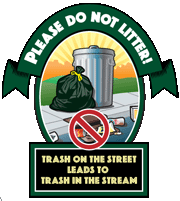 Litter and debris can clog storm drains and be carried directly into a nearby stream, pond, river or bay. Keep trash in your car until it can be disposed
of properly! Street litter such as styrofoam, plastic, cigarette butts, and paper can be prevented from blowing and washing into inlets by keeping trash bins covered and
by not littering.
Litter and debris can clog storm drains and be carried directly into a nearby stream, pond, river or bay. Keep trash in your car until it can be disposed
of properly! Street litter such as styrofoam, plastic, cigarette butts, and paper can be prevented from blowing and washing into inlets by keeping trash bins covered and
by not littering.
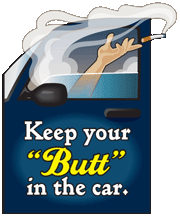 Did you know that cigarette butts make up a very large portion of the litter and trash on our streets and highways? DelDOT spends a lot of money
to sweep tons of cigarette butts from the roads each year. The butts wash into storm drains and streams, where they pollute water and poison wildlife. Plus, they can
ignite fires in dry brush and mulch!
Did you know that cigarette butts make up a very large portion of the litter and trash on our streets and highways? DelDOT spends a lot of money
to sweep tons of cigarette butts from the roads each year. The butts wash into storm drains and streams, where they pollute water and poison wildlife. Plus, they can
ignite fires in dry brush and mulch!
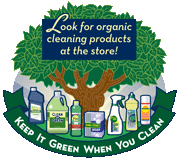 Reducing your use of toxic or harmful chemicals around the home reduces the potential for these materials to find their way into our waterways.
If you must use chemicals such as cleaners, choose organic or biodegradable products whenever possible.
Reducing your use of toxic or harmful chemicals around the home reduces the potential for these materials to find their way into our waterways.
If you must use chemicals such as cleaners, choose organic or biodegradable products whenever possible.
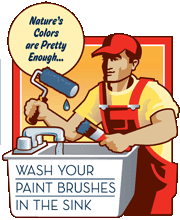 Always use household chemicals such as cleaners, paints and pesticides according to the label directions and dispose of them properly.
NEVER dump or wash leftover materials into storm drains!
Always use household chemicals such as cleaners, paints and pesticides according to the label directions and dispose of them properly.
NEVER dump or wash leftover materials into storm drains!
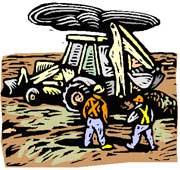 Construction sites can release large amounts of harmful sediment into streams if proper erosion controls are not used. Some common erosion control practices are
vegetative filter strips, silt fence, gravel drives, and runoff inlet protection. For more information, please see the
Delaware Sediment and Erosion Control Handbook .
Construction sites can release large amounts of harmful sediment into streams if proper erosion controls are not used. Some common erosion control practices are
vegetative filter strips, silt fence, gravel drives, and runoff inlet protection. For more information, please see the
Delaware Sediment and Erosion Control Handbook .








